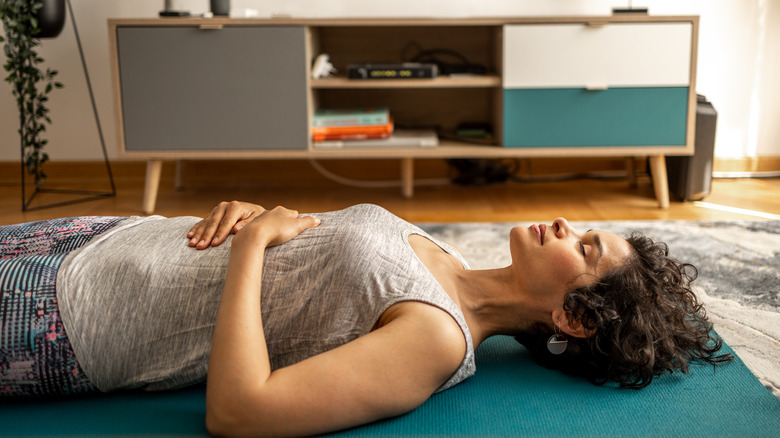Our Doctor Explains The Best Way To Stop A Panic Attack Fast
People who experience panic attacks may sometimes feel on edge for fear of having an attack in an inopportune place, according to the National Institute of Mental Health. Unlike being stressed or anxious about something, a panic attack can arise without a trigger. Someone having a panic attack will suddenly be overcome by a sense of worry or fear, and this triggers the sympathetic nervous system. Your heart will suddenly race, your breath will quicken, or you could break out into a sweat. Some people might have digestive issues or problems concentrating.
In an exclusive interview with Health Digest, Chief Medical Officer and Physician at One Oak Medical Dr. Jason Singh says the best remedy for stopping a panic attack is to understand why the body is responding the way it does.
"The increase in breathing and heart is the body's mechanism to find more ways to get more oxygen into muscle in case they need to react during this 'fight or flight' response of an anxiety attack," Singh said. "Sweating helps to cool the body. Trembling helps the muscles respond. Nausea/GI issues are because the GI system essentially shuts down since it's not essential in an emergency." Singh also has other strategies to help ease a panic attack.
The grounding technique for panic attacks
During a panic attack, your mind might be racing with uncontrollable thoughts and worries. You might also be flooded with negative memories. In an Instagram reel, Dr. Jason Singh suggests a popular mindfulness technique to engage your parasympathetic nervous system and direct your attention to your senses. Grounding methods such as this 5-4-3-2-1 technique give your mind something else to do rather than allowing these feelings to ruminate (per Therapist Aid).
When you feel a panic attack coming on, name five things you see around you. Then identify four things you can touch, three things you hear, and two things you smell. Finish off this grounding technique by offering some positive advice from your future self that would be useful to you at this moment.
"This tangible pattern will bring your focus to the present–the here and now–with a positive, internal dialogue," he says. "That's what interrupts fearful thoughts."
Other calming strategies for panic attacks
Because a panic attack activates your fight-or-flight response, Dr. Jason Singh says that deep breathing helps to counter the physical effects of a panic attack. "Increased oxygen into the body also lowers heart rate, which signals the body that it does not need to 'rev up' during an attack."
Deep breathing exercises can also train your body to relax when you're not having a panic attack. According to a 2016 study in Perspectives in Psychiatric Care, eight weeks of diaphragmatic breathing practice can reduce overall levels of anxiety and heart rate.
Guided imagery and meditation also serve to redirect your mind from repetitive thoughts to something specific. Meditation works to engage your brain's prefrontal cortex (the organizing part of your brain) rather than your amygdala (your emotional brain).
"Also, there is something called cognitive reappraisal, which is a way to identify thoughts that may be irrational which is triggering the anxiety and then consciously replacing them with more positive and realistic perspectives," Singh said. He adds that sometimes the best way to ground yourself in the present moment is to have strong support from friends and family.


